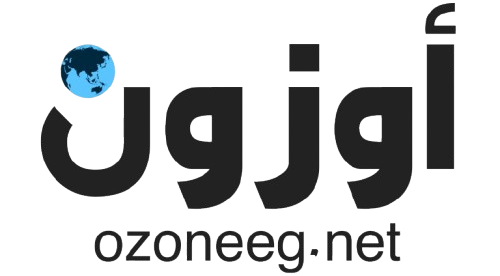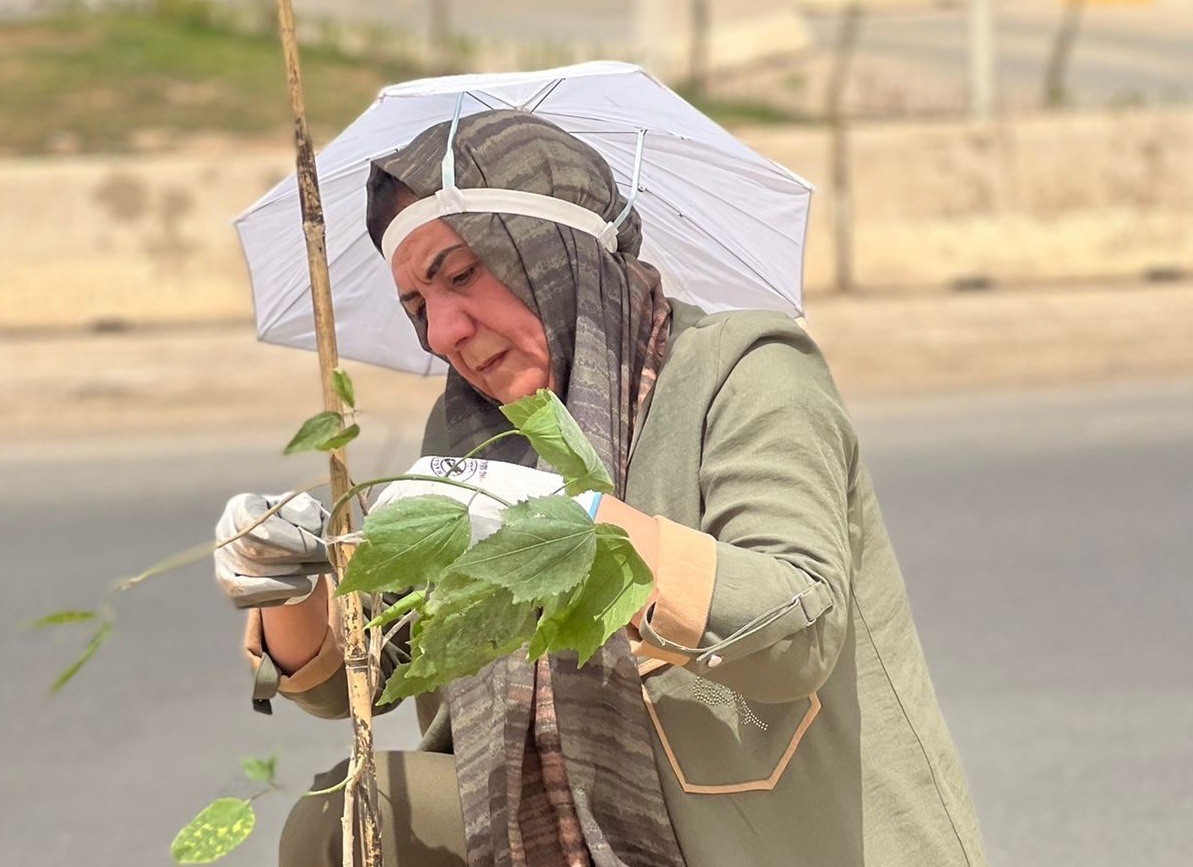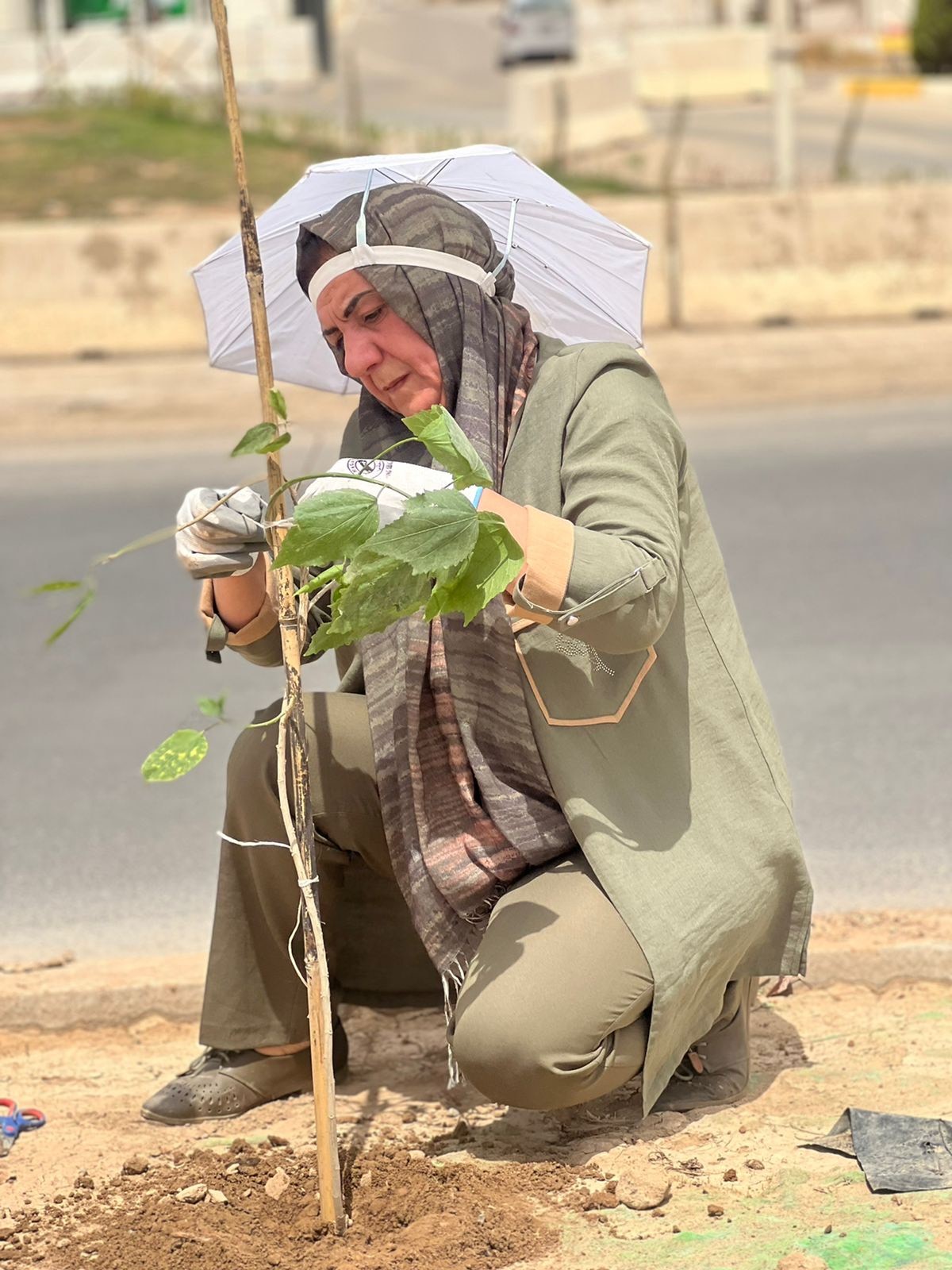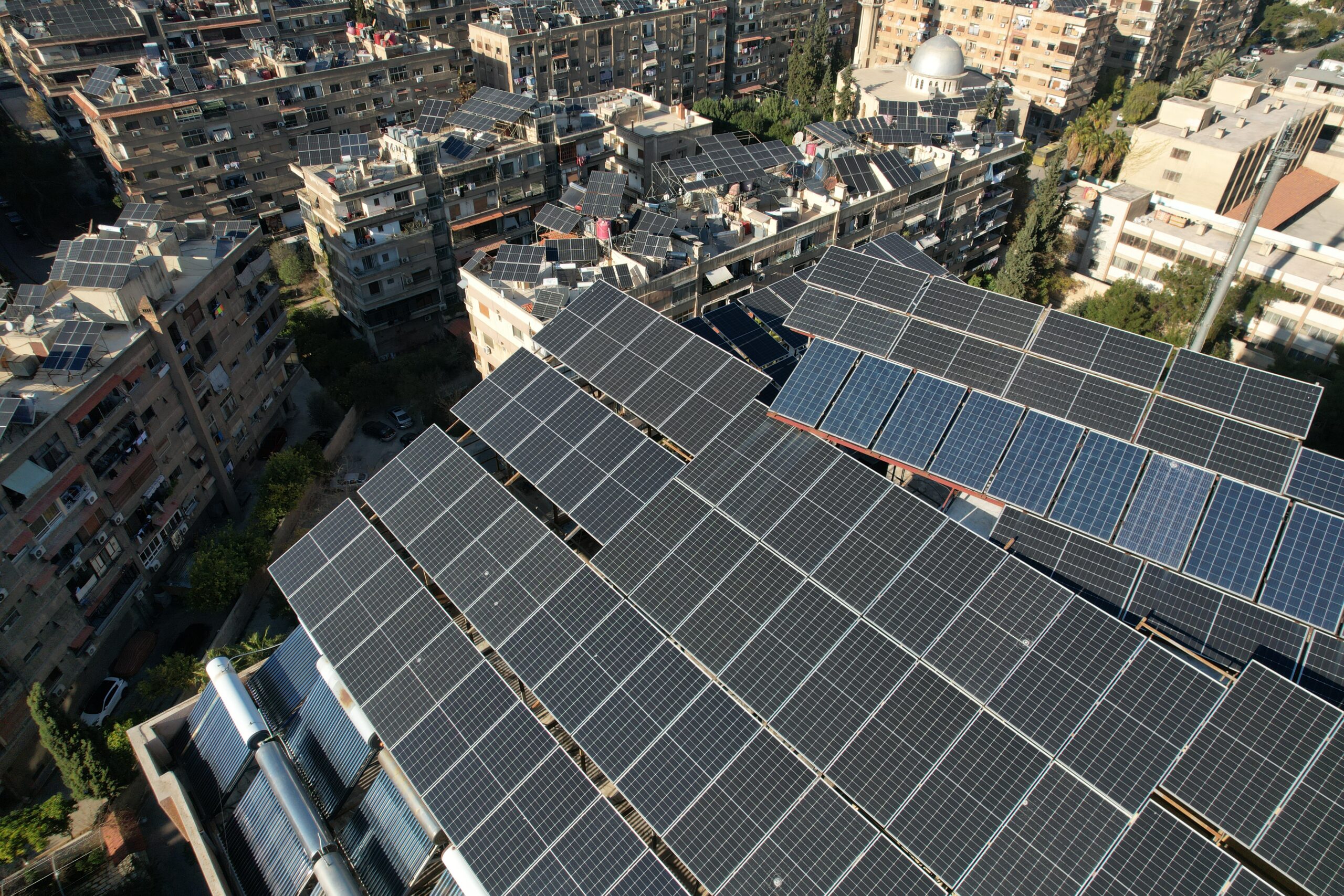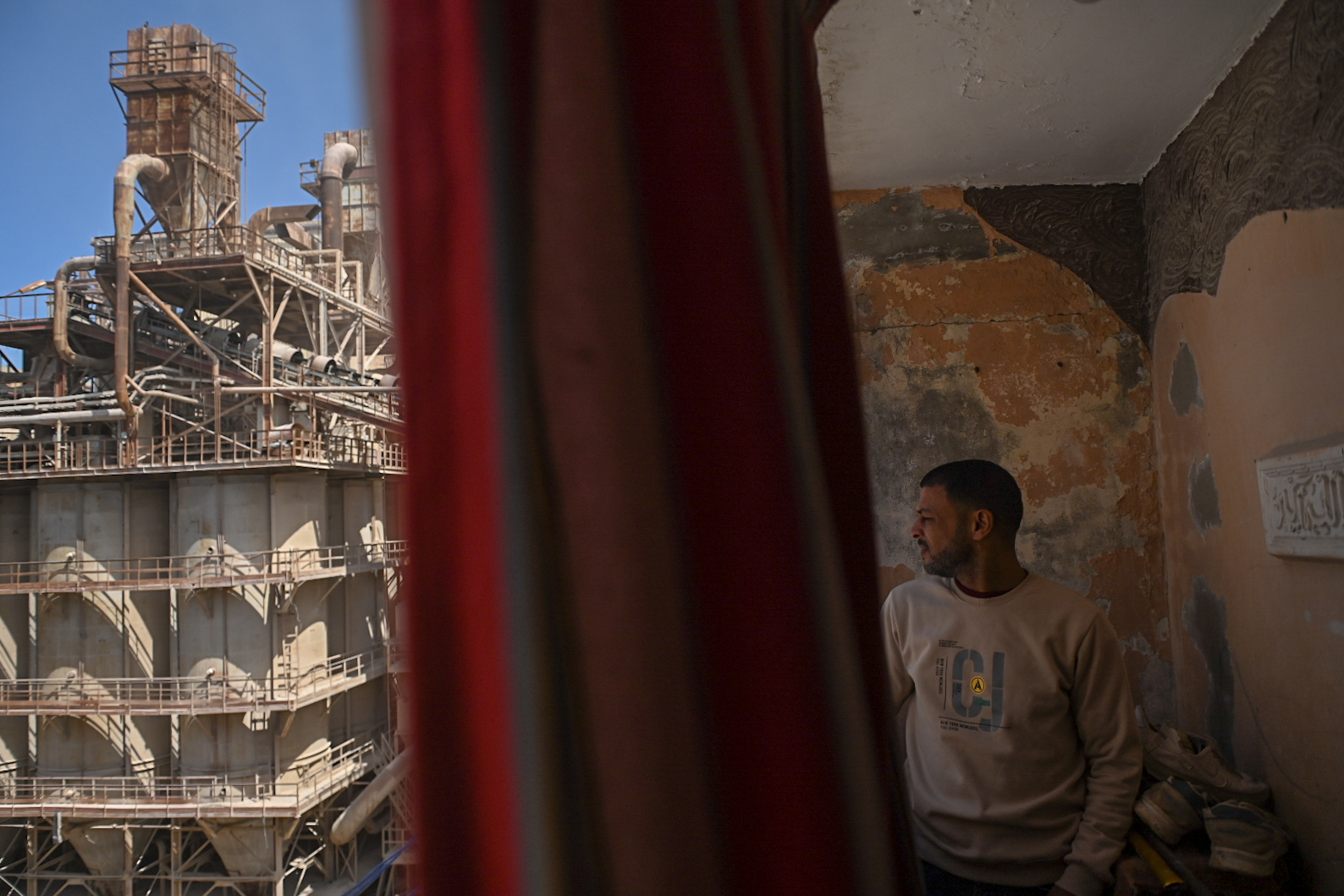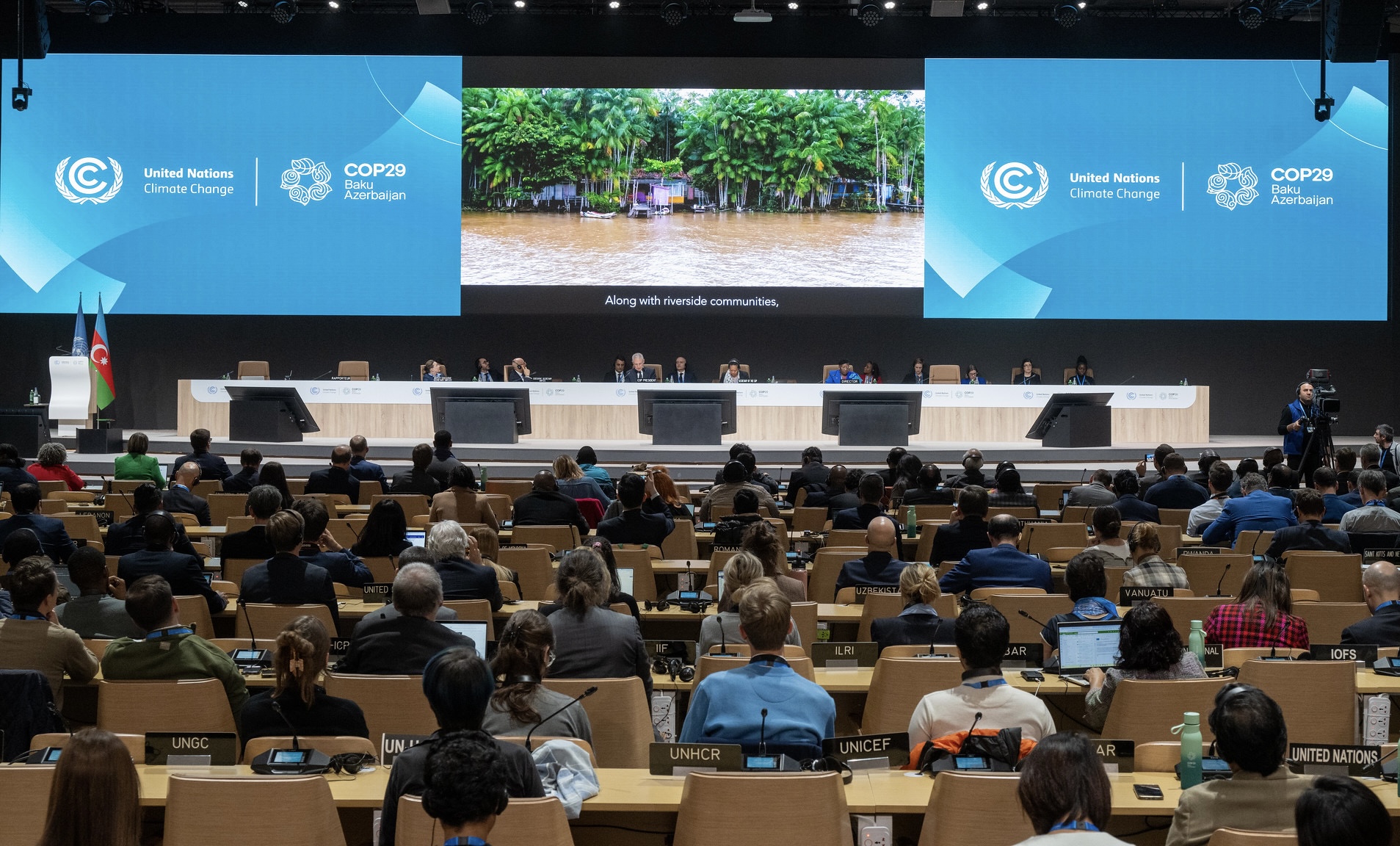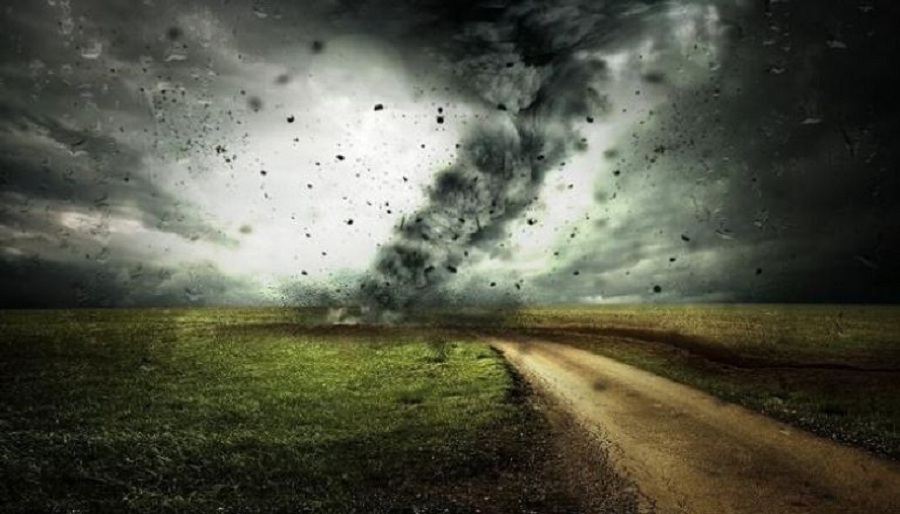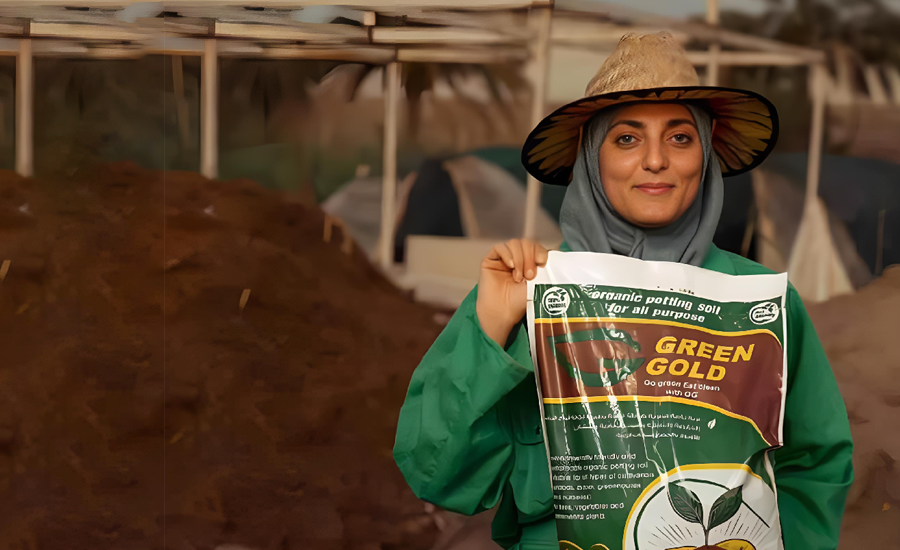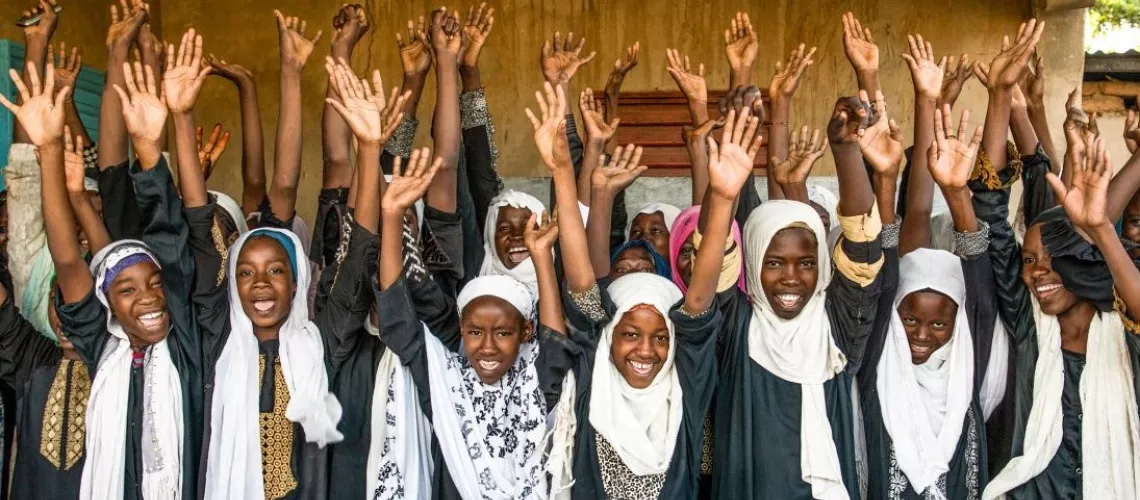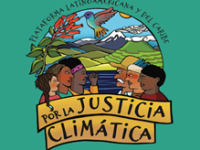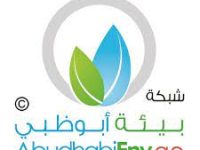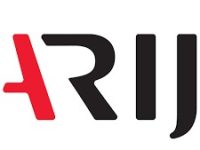For the sake of clean air in Kirkuk and to enhance the role of women in confronting climate change, Shekofa launched afforestation campaigns to expand green spaces and succeeded in convincing others to join her, turning into an icon of defiance.
Her journey began in the Sekanyan area, located in the city of Kirkuk. famous for its oil wells, which contributed to the air pollution. She soon became the role model for everyone, including clerics, civil society organizations, and volunteer groups.
Shekofa Muhammad Obaid, 64 years old, says, “the area was a desert devoid of greenery. I could not bear this view and changing the situation was necessary. This is what prompted me to start afforestation campaigns in the area.”
“I distributed trees to schools, locals, local neighborhoods, specifically the Christian neighborhood and the outskirts of the area in general,” she added.
Shekofa, with a degree in psychology specializing in educational guidance, launched the first tree-planting campaign in the Sekanyan neighborhood.
“When the neighborhood was built, I thought about our first campaign seven years ago or more. In 2010-2011, especially after the construction of schools, it was important to educate the next generation about the importance of taking care of the environment, green trees, and rationing the consumption of resources.”
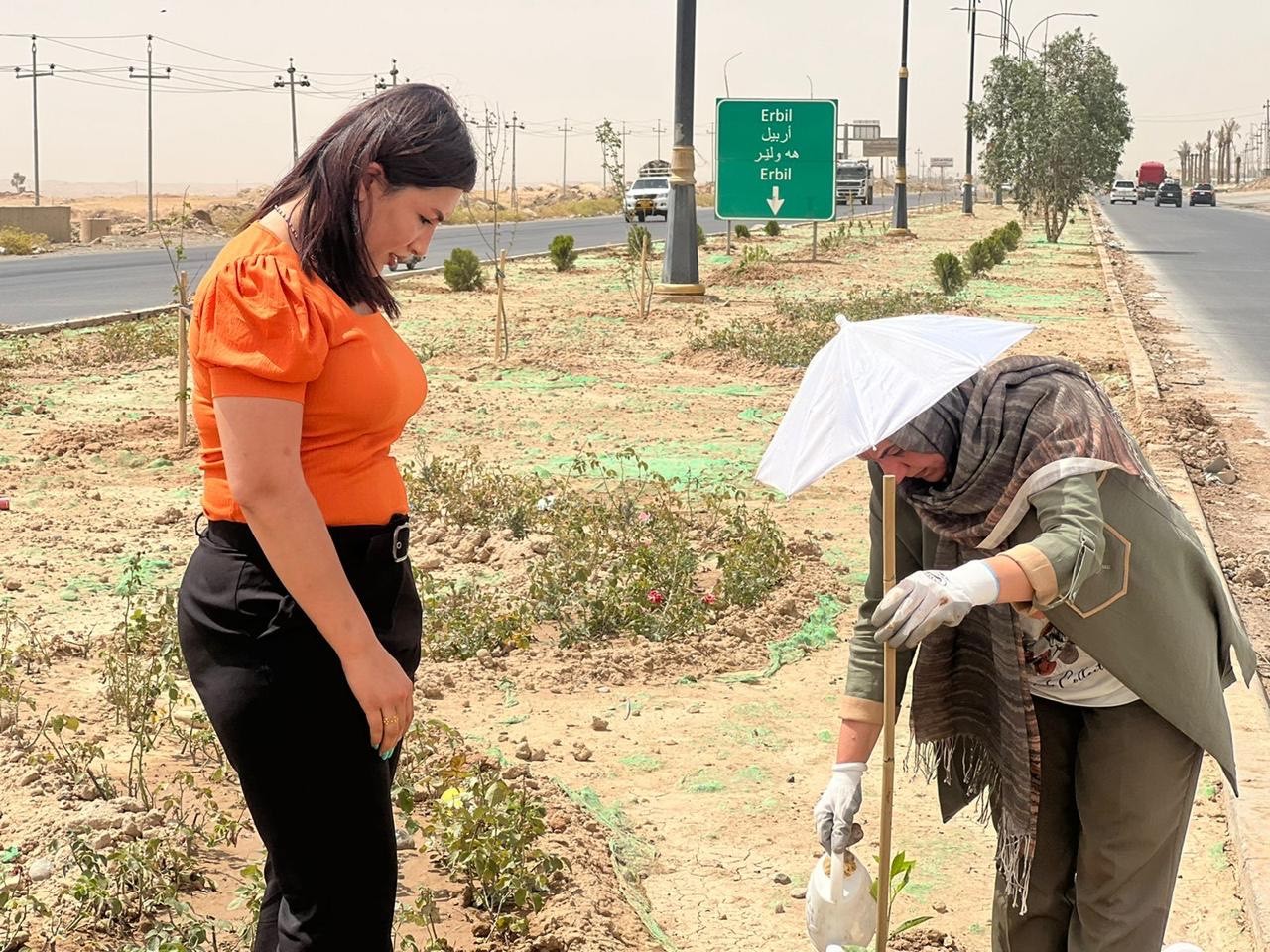
The fact that the Sekanyan region is located about a kilometer away from the state-owned North Oil Company (NOC), which oversees Kirkuk oil wells, asphalt plants, and other factories, has led to an increase in the rate of toxic gas emissions and air pollution in the region throughout these years. This has caused a lot of suffering to the people of the region, especially women, children and the elderly.
According to a study prepared by IQAIR, a Swiss company concerned with air purification issues, for the year 2022, Iraq ranked second in the list of countries with the highest air pollution. This study also shows that air pollution rates in Iraq have doubled in one year.
In 2021, the air pollution was 49.7%, and in 2020, Iraq was ranked tenth at 39.6%, which draws attention to a previous statement by the Minister of Environment, Jassim Al-Falahi, who said, “pollution related to oil production is a major reason behind the high rates of cancer.”
The percentage of greenery in Kirkuk Governorate does not exceed 2%, according to statistics from Kirkuk government departments published earlier by KirkukNow.com, while the international standards indicate that this percentage should not be less than 15%.
There are about 200 public parks in the city of Kirkuk, a few of which are more than several dunams in the area (0,5 hectare), while the rest are smaller, in addition to 81 medians – one to five kilometers long – where trees are planted.
Kirkuk Governorate, 9,600 square kilometers, consists of city center and four districts. The population is estimated at more than 1.7 million people. Kirkuk is a disputed area between the Iraqi federal government and the Kurdistan Regional Government (KRG). Its fate is to be determined within the framework of Article 140 of the Iraqi Constitution, a roadmap for the disputed territories from Khanaqin, east of Baghdad, on the border with Iran up to Sinjar in the northwest, on the border with Syria.
Restoring Pulse to the Heart of the Environment
The beginning was very challenging because 6-7 years ago, no one was interested in the environmental field and there was no support for activists in this field. As one of the women who have been actively and voluntarily working in the environmental field since 2005, Shekofa says, “this made me research more. Is it only me who believes the environmental reality in Kirkuk is poor, or are there others concerned about the environmental situation?”
“I discovered that there are some people interested in this field, and their focus was initially on the colleges at the University of Kirkuk, while our work team had a footprint in the Technical Institute in Kirkuk,” she explains.
There was an area of approximately 3 dunams (0.3 hectares) located between the scientific departments and the professors’ residential neighborhood.
“It was a waste dump, so we cleaned this space in cooperation with the official authorities, and after that, we purchased approximately 500-600 seedlings and they were planted in this space,” according to Shekofa.
As the head of the Green Kurdistan Association in Kirkuk, Shekofa left her fingerprints in many places within Kirkuk, including the Sekanyan neighborhood.
“I work constantly with the relevant authorities and coordinate with them because this provides us with support and capabilities that we do not have as activists, despite their scarcity, to sustain work in this field.”
When the extremist militants of the Islamic State of Iraq and Syria ISIS imposed their control over Nineveh and other areas in Kirkuk in 2014, it proposed three options to the Christians: convert to Islam, pay a tax, or leave their areas without any belongings, so most of them chose to flee, and part of them headed to Kirkuk.
“Following the events of 2014, we launched another campaign and planted hundreds of trees in schools, including Sekanyan School as well.”
That period was very difficult, and many Christians were afraid of ISIS storming their region, so some of them emigrated during that time.
“I thought if they see us working in the area and taking care of them, they would not migrate and leave everything behind.”
Positive Impression Generates Partners
Following Shekofa’s campaign in Sekanyan, Iyad Thomas Liwa, the pastor of the Chaldean Marpolis Church, showed great interest in planting thousands of trees in the area.
“We belong to this land and this land is ours. Therefore, we must protect it and take care of it because our region has suffered greatly from pollution since its founding,” he told KirkukNow.
The process continues annually in October or March, both seasons of planting, depending on the temperatures and weather in general, according to what Pastor Iyad said.
The church is now cooperating and taking advice and guidance from some specialists and those interested in the field during the process of selecting the types of trees that suit the climate of the region to reduce the rate of tree loss due to drought or other factors.
“I, the work team, and the Women’s Advisory Council have a plan for planting this year as well, in the middle of October, and part of the plan is to provide the Chaldean Church of St. Paul with trees to sustain the process of increasing green spaces,” Shekofa says.
The pastor of the Marpolis Chaldean Church also considered an initiative by the church to reduce the volume of emissions in the region and air pollution by installing solar energy systems at the church to generate electricity instead of diesel generators that generate toxic gases.
Health Risks Raise the Alarm
Last year, Kirkuk accounted for 2,000 cases of cancer out of a total of 35,000 cases throughout Iraq, 57% of whom were female, out of which 20% had breast cancer, according to the Green Kurdistan Association.
Director of the Kirkuk Center for Oncology and Hematology, Dr. Niaz Ahmed, says that the afforestation process is very necessary and is considered an essential factor in reducing the volume of gas emissions in any area where afforestation operations are carried out, since areas devoid of green spaces increase the volume of emissions and have a greater impact on the residents of these areas, causing more cases.
There are five main oil production fields in Kirkuk, supervised by the NOC producing approximately 350,000 barrels per day, most of which are pumped to refineries in Iraq, Farhad Hamza, chief engineer of the NOC, told KirkukNow.
These fields include 730 oil wells, approximately 60 of which are located near the Sekanyan neighborhood, where 20-25 wells operate daily. During gas isolation operations, a high percentage of it is released into the air, which increases the level of pollution in the area.
Iraq annually burns 17 billion cubic meters of associated natural gas when drilling oil, says Govand Sherwani, an energy expert.
Gas emissions from factories, cars, and oil wells pose a threat to human health, as they cause an increase in the percentage of polluted air in these areas, especially if the area lacks sufficient afforestation operations and green spaces. All of these factors together have a direct impact on human health, particularly the respiratory organ, and increase the chances of blood diseases and cancers.
“As specialists in this field, we always notice a high rate of respiratory diseases and cancers among workers in oil companies and factories,” says the director of the Kirkuk Center for Oncology and Hematology.
He assures that the both air pollution and the bad habits of people are the contributing factors that increase respiratory diseases and cancer in general. These statements contradict the statements of Ihsan Abdul Jabbar, Minister of Oil, in 2022, who denied any link between high cancer rates and air pollution by oil exploration and drilling operations.
Dr. Muhammad Khidhir, head of the climate change department that was recently established in the Kirkuk Environment department, thinks “Kirkuk Environment warns against non-compliance with environmental specifications for companies and factories, given that Iraq is part of global agreements concerned with improving the environment and that Kirkuk Environment is one of the provinces most affected by environmental pollution due to the failure to adhere to environmental requirements.”
According to United Nations UN statistics and warnings, Iraq is ranked fifth among the countries most affected by the repercussions of climate change, which include the risks of water scarcity, drought, scorching temperatures, pollution, and other natural disasters.
Expanding Campaigns to Plant More Trees
“I am no longer alone in the field of environmental awareness, and there are now many institutions and volunteer teams concerned with the environment,” Shekofa says.
“The increase in afforestation campaigns targeting the Sekanyan region in particular and Kirkuk in general, seedlings distributed on a seasonal basis, and planting them made me very happy. I don’t feel like I am fighting alone anymore.”
As Sekanyan residents feel these gases they inhale every day once they reside the area, it was urgent to unite efforts by community members, volunteer teams, and organizations working in the environmental field to confront the risks.
Pastor Iyad Thomas says that because of these campaigns by volunteer teams, institutions concerned with the environment, activists, and the church’s endless support, over the course of six years, the number of trees they planted in the region is approximately 3,000-4,000 seedlings.
The priest confirmed their cooperation with all interested people and that the afforestation operations continue on seasonal basis because these campaigns have inspired other people of the region, the volunteer teams, and some concerned environmental parties, including the Kokar Foundation.
In recent years, the Kokar Foundation for Sustainable Development and Volunteering, which is a diverse social initiative founded on June 16, 2016, by a group of activists, has been active in the field of the environment, especially afforestation campaigns.
The Kokar Foundation have, since the start of the afforestation operations up to now, produced and distributed approximately 70,000 seedlings, all of which are distributed to the center in the city of Kirkuk and all the districts, sub-districts, and villages, including the village of Sekanyan, says Mustafa Mahmoud, one of the volunteers of Kokar.
For the spring of 2024, Kokar is planning to launch its sixth special campaign to distribute 35,000 seedlings, which will also be distributed to Kirkuk city center and all districts and sub-districts, including the village of Sekanyan.
On the other hand, the Kirkuk Youth and Women Peace Team as part of Salam Camp, with the support of the United Nations Development Program (UNDP), provided the Chaldean Church of St. Paul with 60 Melia trees to be distributed to places that need planting according to the vision of the church in the region.
“The area has been recently built and needs support as it is one kilometer away from the North Oil Company, the Asphalt plant, and other oil wells, so we, as a team, saw that we must contribute a little to help women and children, as they are the groups most affected by air pollution in the region,” explains Sazan Majeed, one of the members participating in the initiative and a member of the Kirkuk Al-Salam Youth Team.
Additionally, with increased awareness and the contribution of volunteer teams and stakeholders in the environment, the number of trees in the area has increased after it was completely devoid of them. The church, in cooperation with these groups, plants approximately 200-300 seedlings on a seasonal basis. In a separate initiative, it has planted approximately 2000 seedlings.
The repercussions of climate change forced many residents to migrate from their hometowns. According to UN statistics, more than 20,000 people in Iraq have abandoned their areas due to drought.
Limited Afforestation Campaign to Face Desertification
“The size of the afforestation campaign cannot be measured compared to the size of the pollution by the oil company and the accompanying pollutants. Very big campaigns are to be carried out by the state to fully preserve Kirkuk’s environment,” says Rudy Anwar, a resident of the region, regarding the issue of afforestation.
“Today, the concerned authorities must carry out the afforestation campaign, especially the exposed areas, because the population is increasing in addition to the increase in demand for oil and needs to dig new wells continuously.”
The scarcity of financial allocations for afforestation and expanding the green spots is a major challenge for volunteers. During the past years, several organizations sought to plant trees and increase the percentage of greenery in Kirkuk, but these projects were not sustainable due to the lack of continuous care for the trees.
“Despite all the efforts we are making to purify the air of Kirkuk, the support is insufficient by the government, and it does not pay real attention to this issue,” Shekofa affirms.
She also added that many production facilities and plants are extending from the outskirts of Sekanyan village to the adjacent Daraman area, most of which operate without the approval of the Kirkuk Environment Directorate.
“Some trees were cut down and agricultural lands were converted into investment projects.”
Pastor Iyad also noted that “there is a lack of community awareness among some people, especially in the field of the environment, as sometimes people burn bushes or waste that collects under trees, which leads to burning the trees along with them.”
Another challenge facing the afforestation efforts, according to Kokar volunteers, is that the seedlings did not grow enough this year to make them suitable for cultivation due to the lack of rain in the winter and the high temperatures in the summer.
“The seedlings have not yet matured well enough to qualify for planting due to high temperatures, climate change, and the pollution of the governorate’s skies.”
In the end, Shekofa says women have a role in confronting climate change. “A step of a thousand miles begins with a single step, so do not be afraid, and be strong, for you are up to it and you can achieve the goal. Do not depend only on others yet rather be the one who extends a helping hand to others.”
(This report was produced as part of “Aswatuna” project by Internews.)
Go to the Arabic version
